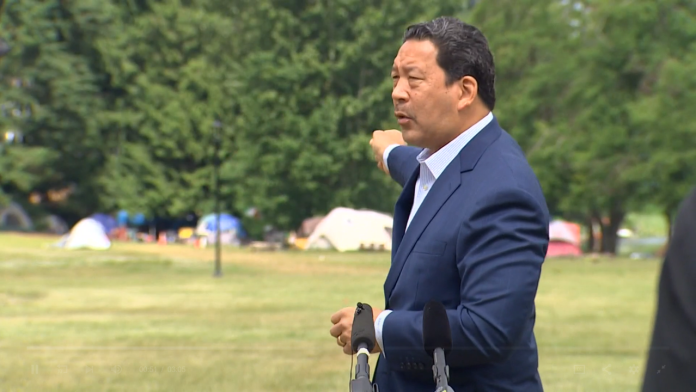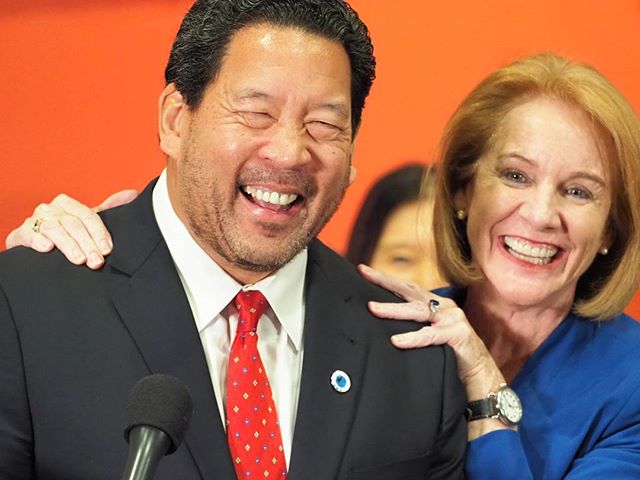
Former Seattle City Council President Bruce Harrell held a mayoral campaign event Friday in front of a homeless camp on a playfield at Broadview-Thomson K-8 School in Bitter Lake. Harrell avoid the word “sweep” or “camp removal” but still argued the homeless people shouldn’t be camped there.
“Last week I called for the City to dedicate the majority of federal ARPA relief funds to this exact effort — with a priority of addressing encampments in sensitive and incompatible areas — like school properties, parks, playfields and sidewalks,” Harrell said in a statement. “Instead, we saw a peanut butter allocation of funds that will only result in further delays in buying and building housing, and hiring the service providers needed to make real progress.”
Harrell had called on the City to dedicate at least another $20 million of its $128 million allotment of American Rescue Plan Act (ARPA) dollars on homelessness, adding to the $50 million that the Mayor and Council already tabbed. A McKinsey analysis last year found the Seattle would need to spend between $450 million and $1.1 billion per year to end homelessness.
As Harrell was delivering his remarks, a group of incensed locals interrupted him and demanded removal of the encampment, which they associated with needles, human waste, and crime, KING 5 reported. On Friday, Mayor Jenny Durkan did oversee a sweep of an Olga Park encampment in Ravenna, which was spurred by the murder of one of the campers by someone who lived elsewhere. However, in the case of the Broadview-Thomson playfield, Mayor Durkan has sought to foist responsibility onto Seattle Public Schools (SPS). She has been ramping up pressure on SPS to stand up their own Navigation Team equivalent in order to conduct homeless outreach and disperse encampments from its properties. Durkan has also been pushing service providers to participate in sweeps and belatedly snuck terms in contracts obligating them to so, before backing down from these strong arm tactics earlier this week, Erica C. Barnett reported.
Durkan was roundly criticized for her SPS ultimatum, including from Harrell.
“It is both inappropriate and inhumane for the City of Seattle to expect a school district working overtime to educate and support 54,000 students to hire, train, and bring to scale a homelessness outreach and services program,” Harrell said in a statement. “Providing housing and support for vulnerable people is the job of the city and county, working together to provide immediate housing, wraparound services, and the support needed to rebuild lives.”
Council President M. Lorena González, who is also running for Mayor, criticized Durkan, but also her opponent Harrell who her campaign argued was “exploiting the suffering of others” and fixated on symptoms rather than causes and solutions. “Instead of meaningless photo ops or proposing to build a dashboard to study homelessness, Lorena is working to secure resources and broad cooperation necessary to address this humanitarian crisis,” González’s campaign manager Alex Koren said in a statement.
Fellow mayoral candidate Jessyn Farrell, a former state representative, agreed, saying Mayor Durkan was “passing the buck.” Deputy Mayor Casey Sixkiller, who is also in the crowded mayoral field, argued SPS had failed and was to blame, echoing his boss. Sixkiller and Durkan have argued SPS should spend its reserves to fund homelessness services, which drew the ire of school boardmember Liza Rankin. Opponent Andrew Grant Houston, meanwhile, pointed to his plan to build 2,500 tiny homes. All agreed that Bruce Harrell had 12 years on the Seattle City Council to address homelessness but had failed to do so.
“Bruce spoke today about ‘months of finger-pointing,’ but spent years on City Council with the direct ability to develop and implement a ‘clear and transparent plan’ and failed to do so,” the Houston campaign said in statement yesterday. “Career politicians like Bruce were there when we declared homelessness an emergency and proceeded to sit by for years as the issue got worse.”
Even mayoral candidate Lance Randall landed a blow, KING 5’s Chris Daniels reported. “I am glad Bruce is finally acknowledging the problem, but I am disappointed that he did not take action to deal with the issue when he was the President of the City Council,” he wrote. “Press conferences do not solve problems. Action does.”
Mayoral candidate Colleen Echohawk, executive director of homelessness service provider Chief Seattle Club, seemed to sidestep the food fight about Harrell’s press conference. Instead she spent the day messaging about ending exclusionary zoning and dropping her housing justice plan.
The school district, for its part, argued the Mayor’s request was unreasonable and her proposal unlikely to succeed in solving the issue: “While our goal is to clear the property of all unauthorized camping as soon as possible, we do not have the expertise or resources to do so effectively. Moreover, a ‘sweep’ of the encampment (as some community members have urged) would only serve to dislocate the campers into other areas of the community, likely including the adjacent city park.”
“Our billion-dollar budget is intended for the education of children,” Rankin said at a school board meeting Wednesday. “It runs 104 schools, it employs about 8,000 staff, it serves 54,000 students, and it is still not enough to cover counseling, nursing, full-time librarians, and more at each and every school… So we don’t have funding in excess to divert to rehousing adults living in Seattle.”
“That being said, we continue to be open and wiling to partner with any and everyone who wants to support the district in the compassionate rehousing of people in our community who deserve much better,” Rankin added.
As the Mayor and the contenders to replace her jockey for position on homelessness, it’s clear there are no easy answers. Soundbites aren’t going to slice away decades of policy paralysis, unchecked racism, and spiraling wealth inequality. However, attention is clearly focused on the issue of homelessness, and now is really the time for leaders to seize the moment and bring a real solution to fruition.
Or will we be left with a clown car full of candidates squirting each other with seltzer water instead?
Doug Trumm is publisher of The Urbanist. An Urbanist writer since 2015, he dreams of pedestrian streets, bus lanes, and a mass-timber building spree to end our housing crisis. He graduated from the Evans School of Public Policy and Governance at the University of Washington in 2019. He lives in Seattle's Fremont neighborhood and loves to explore the city by foot and by bike.


